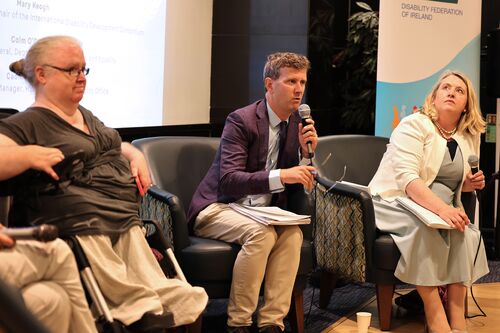Panel discussion: UNCRPD and Disability Rights: From Ratification to Reality
June 18 2025, 11:55am

Following the formalities of our AGM on Tuesday 17 June, we dove into a vibrant and rich discussion on the current and future state of the implementation of the UN CRPD in Ireland.
It's been 20 years since Ireland adopted of the UN Convention on the Rights of Persons with Disabilities, UN CRPD and seven years since its ratification. We brought together expert voices to reflect on progress, challenges, and what’s needed next.
Our Panel:
- Mary Keogh, CBM Global Advocacy Director and Chair of the International Disability Development Consortium.
- Colm O’Conaill, Assistant Secretary General, Dept. of Children, Disability, and Equality.
- Caoimhe Gleeson, National Programme Manager, HSE National Human Rights Office.
What We Discussed
Momentum, But for How Long?
All speakers agreed that disability is higher on the political agenda than it has been in decades. A new National Disability Strategy, NDS is imminent, disability is now represented at Cabinet level, and a dedicated Disability Unit is being established in the Department of the Taoiseach. But this came with a warning that this political window won’t necessarily last forever. Action must match ambition to keep disability at the top of the political agenda.
Implementation is Everything
The UN CRPD has driven important legislative and policy change, such as the Assisted Decision-Making Capacity Act, but real impact depends on implementation. Collaboration between government departments, disabled people’s organisations, DPOs, and service providers was seen as essential to avoid siloed systems and ensure joined-up supports.
Mainstreaming and Inclusion
With over 22% of the population identifying as disabled, disability is no longer a niche issue. The panel stressed the importance of embedding disability inclusion across all public services, especially in education, health, transport, and employment. True mainstreaming also means planning for people’s needs across the life course.
The Need for a Radical Shift
Panellists and audience members called for a more radical and urgent approach to delivering personalised, rights-based supports. Greater personal assistance, real choice and control, and the meaningful involvement of disabled people in service design and governance are key to this shift.
Gaps, Risks and Frustrations
Our audience members spoke powerfully about how major gaps remain. This includes a lack of accessible data, weak advocacy infrastructure, poor service coordination, and under-recognition of conditions like deafblindness and Fetal Alcohol Spectrum Disorder, FASD. The panel also warned against over-reliance on private or emergency solutions, calling for proper long-term planning and funding.
What the Audience Said
Audience members voiced strong support for the urgent implementation of the UNCRPD but also deep frustration at the slow pace of progress. Several raised concerns about inaccessible transport, long waiting lists, and the failure to provide timely support to families in crisis. Others highlighted the burden of constantly having to “push” for rights already promised. There were powerful calls to better support peer-led advocacy, invest in community services, and fully value the lived expertise of disabled people.
Recognition and Representation
Speakers and audience alike stressed the need to pay disabled people for their time and expertise, not just rely on them to volunteer their lived experience. Disabled people must be central, not just consulted.
Don’t Waste the Moment
This is a pivotal time for disability rights in Ireland. The Convention has created the mandate. The political alignment is there. The next challenge is shared: to work together, act with urgency, and move from aspiration to real change.
